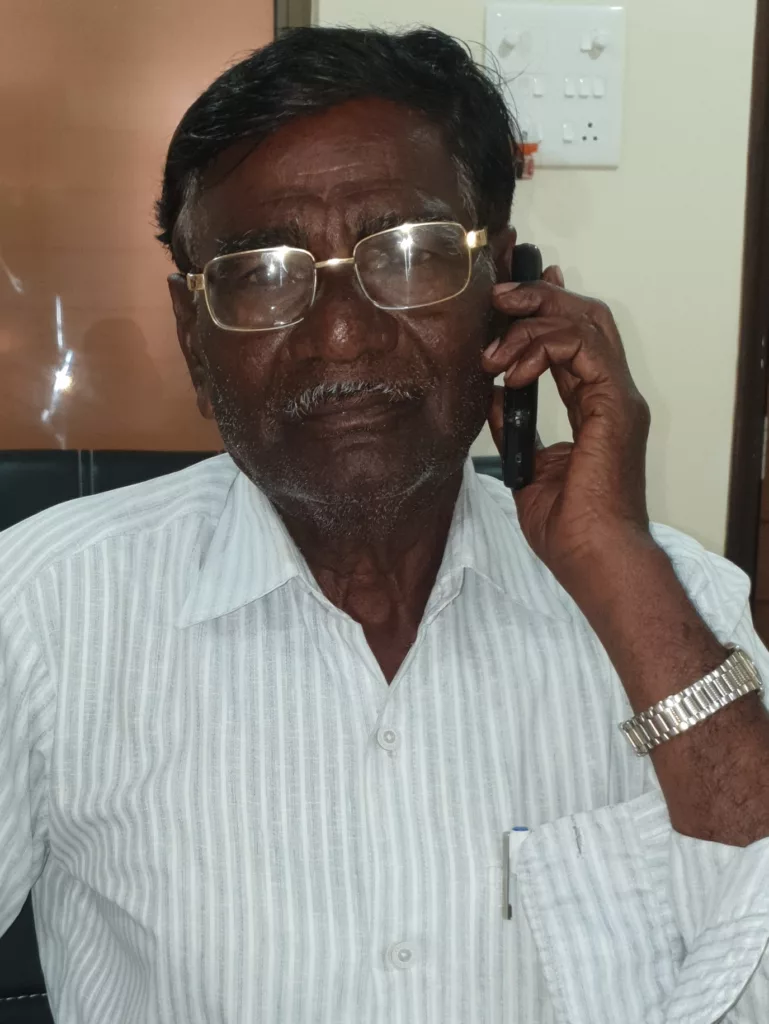Wasudeo. Does this name evoke a memory of a person who you met and spoke to during your Sevagram days? You surely would recall him—this man- Friday from the dean’s office knew the art of getting the impossible done. He spent four decades in Sevagram (1969- 2007) and is still remembered for his work.
I spoke to him, a day before, at length.

Born six weeks before India got freedom, Wasudeo’s father—Shri Sitaram Deodhe—passed away when he was in his mother’s womb. His mother—she embodied the tenacious spirit found in India’s rural communities—worked in the fields and raised her three children, with some support from the family. Born and raised in Kharangana Gode, located just 5 km south of Sevagram, he went to the local school. Santosh Rao Gode was the leader of the Indian National Congress party and had won the Lok Sabha seat from Wardha in 1977. Wasudeo’s mother worked with the Gode family and struck a deep friendship with Santoshrao’s mother.
Mr Gode—his two sons are MGIMS alumni: Dilip, (1971 batch) is the president of MGIMS Alumni Association, and Shirish graduated from the class of 1972—helped Wasudeo sneak into Kasturba Health Society. He had failed his matriculation examination. Not qualified for the clerk’s post, he became an attendant in July 1969, a fortnight before the first batch of medical students was admitted to the MGIMS. The word “No” didn’t exist in his vocabulary. He ran places, doing almost any job, and executing every order. Soon he became a caretaker of the doctors, government officers and foreigners who would frequent Sevagram those days– taking care of their meals, ensuring them a homely accommodation, and fulfilling their (often)-unvoiced needs.
Wasudeo quickly began to enjoy the trust of all those who mattered: Dr Sushila Nayar, Manimala Chaudhari, Dr P Nayar and the Dean. Often the first to arrive in the office, he would work until late at night. Soon, he found his way into the Dean’s office, where, over the next four decades, he served several deans- Dr ID Singh, ML Sharma, KS Sachdeva, Prabhakar, JS Mathur, BC Harinath, OP Gupta, and Mrs P Narang. When asked who was the most difficult—and the most benign—dean to work with, Wasudeo deftly brushed aside the query. “I never judged my bosses,” he replied. He retired in 2007.
“PMT was a major activity those days. I used to do almost all tasks related to the PMT: getting question papers in sealed envelopes; going to the printing press; arranging the centres at Nagpur and Delhi; helping MGIMS faculty handle the nuances of the centre on the exam day; packing, coding and sealing the answer sheets; delivering them to the examiners; housing the checked copies in the Dean office; sending telegrams to the chosen ones; answering queries from the students and their parents and fulfilling expectations and needs of all stakeholders.” He recalled his days when I recently interviewed him. “Also, I used to physically carry all documents related to the KHS biannual meeting with the central and state government in Delhi. I used to run errands between Gandhi Peace Foundation and Nirman Bhavan,” he said.
After the MUHS came into being—in 1997—Nasik became another home for Wasudeo. “Now my task was to handle all university-related papers. I helped countless students get their degrees, certificates, registrations, mark sheets and documents that they needed for their professional careers. It was a labour of love for me. I would pocket whatever students would give me for the task; never ever did I count who gave me what. And I enjoyed incessant love and affection from alumni—right from the first batch,” Wasudeo was barely able to hold tears running down his cheeks.
After retirement, Wasudeo plunged into politics. Elected as the Sarpanch of the neighbouring Warud Gram Panchayat, his stint is an example of what a determined Sarpanch can do for his village. He built roads, erected electricity poles, ensured access to safe water in the village and constructed wastewater drainage systems. “I could identify and fulfil the felt needs of the villages,” he said with a proud voice. The progress in this village is so visible. As I cycle through the five wards of the Warud village, I can see the improvement in the standard of living of the villagers.
Wasudeo keeps coming to the hospital. Seventy-five now, he carefully camouflages his age by dyeing his hair, standing erect and walking briskly. He chooses his words carefully—driven by the local Warhadi dialect. Remarkably free of the maladies that hit people his age, he analyses the local politics with an adroitness that would make Chanakya proud.
He worked for Karmachari Pat Sanstha between 1982 and 1987, for the housing Pat Sanstha between 1987 and 1992, was a member of the Employee Pension scheme Sevagram between 2009 and 2014 and served as the Sarpanch of Warud village between 2015 and 2020. In between, he also served as a member of the ethics committee, MGIMS between 2018 and 2022.
What is remarkable about Wasudeo is his unstinting devotion to the institute he served for four decades–the Kasturba Health Society. No regrets, no bitter memories, no loose talks, no negativity and no pessimism in his voice. All he exudes is genuine positivity and gratitude.